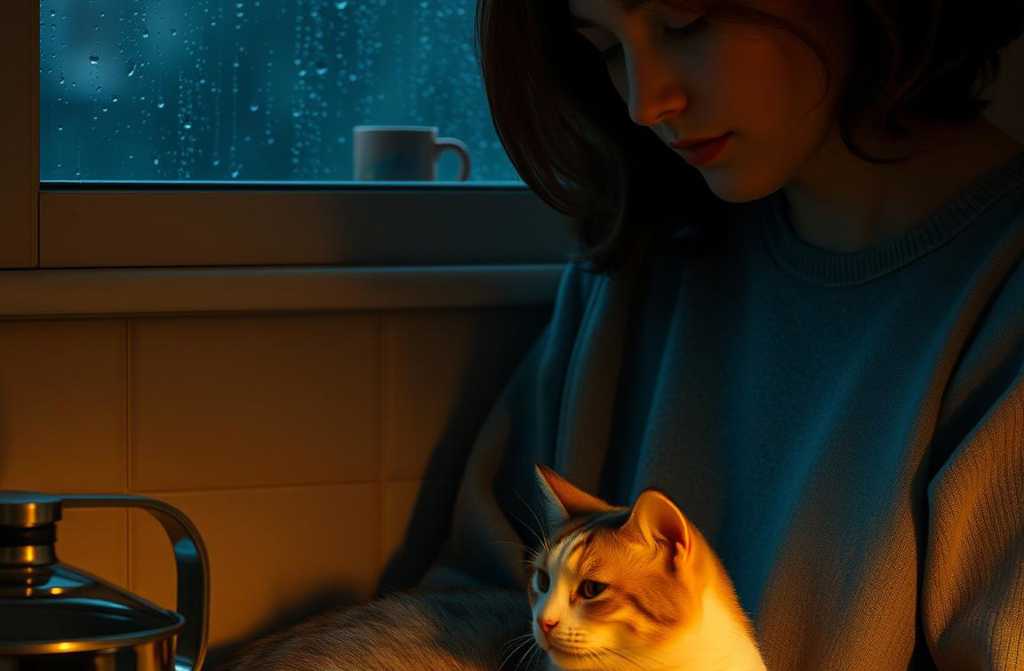“Go, I’m tired of being your backup plan,” I said, turning off the hall light.
Andrew froze in the doorway, as if he couldnt believe I meant it. He hesitated, peering into the darkness as though searching for some hint of forgiveness.
“Emily… you know its not that simple.”
“Go,” I repeated, quieter this time but just as firm.
He left without a word, closing the door softly behind himno slam, just the quiet click of the latch, almost like an apology. I didnt need the light to find my way to the kitchen. I knew exactly where the kettle was, the mug Id used for coffee that morning. My hands shook, so I gripped the cup tighter, my fingers aching as if theyd been out in the cold.
It felt like Id torn something vital out of myselfsomething alive, something Id grown used to, even if it had never brought me joy.
In the hallway, Mittens, my cat, gave a soft meow. I called to her without thinking.
“Come here, fluffball, come to me…”
She didnt. She curled up by the front door instead, tail twitching, already sensing something was off.
Silence settled over the kitchen table. The tea in my cup cooled too quickly. I sat there, staring at the tiles, wondering how it had all started and why it had dragged on for so long.
It began, as these things often do, with flowers. Hed brought them once, grinning, saying, “Missed you.” Id missed him too. Back then, Id still believed missing someone could be simplethat it didnt matter where hed been the night before.
He didnt visit often. But when he did, hed arrive like some weary herostraight from work, exhausted, always with an excuse: “You know how things are at home.”
“I dont expect anything from you, Andrew,” Id told him once, “just come when you can.”
“Dont lie,” hed said, sprawled on my sofa, shoes off, feet up. “You want me to stay for good. And I cant.”
“I know.”
But I waited anyway. And when he came, I was happy. I kept a razor for him in the bathroom, his favourite cheddar in the fridge, bought wine I didnt drink. Hed arrive, eat, sleep, leave. Sometimes with a kiss. Sometimes without.
Once, he stayed for three whole days. For the first time, I let myself wonder: *What if?* But on the fourth day, his wife called. He answered quietly, nodded, dressed, apologised.
“You know shes unwell. Heart problems. I cant just abandon her.”
“Youre not abandoning her. Im not asking for anything.”
“Dont lie.”
He left. And I kept waiting.
Once a month, wed drive to his grandmothers cottage in the countryside. There, he was differentwarmer, real, gentle. We planted radishes in the garden, he fixed the roof, and in the evenings, wed talk by the fireplace.
One afternoon, while I was hanging laundry, an elderly neighbour stopped by.
“Is this your wife?” she asked Andrew.
He hesitated. I stood there, wringing out a pillowcase.
“Not… exactly,” he finally said.
“Oh. Right,” she nodded, not pressing further.
I didnt react, but I barely spoke the whole drive home. He filled the silence with talk about work, the weather, his son.
His son. Sixteen. Id never met him. Andrew said the boy was bright but difficult. His wife was in and out of hospital, struggling. He didnt want to “make things worse for her.”
“And what about me?” I snapped once.
“Youre strong. Youll manage.”
That was the difference. She was fragileshe needed coddling. I was stronggood enough to keep on the bench.
After that night, I changed. I stopped ironing his shirts when he left them “just in case.” Stopped making his favourite stew. When he asked, “Whats for dinner?” Id shrug. “Check the fridge.”
“Youve changed,” he said. “You used to be different.”
“I used to believe youd stay. Now I dont. Now Im just living.”
He left in a huff. Came back three weeks later, drunk, with roses. “I get it. Youre right. But I cant.”
“And I wont wait.”
He didnt understand. CalledI didnt answer. Showed up againacted like nothing had happened. I let him in. That night repeated: wine, talking, a sleepless dawn. Then he leftsame as always.
So I sat down and made a list







